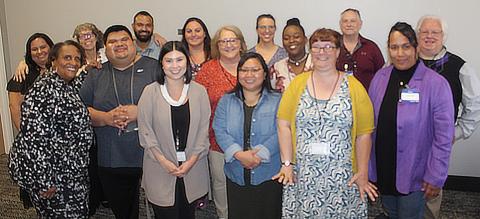Community Health Worker Leadership Committee

The Community Health Worker (CHW) Leadership Committee will be an ongoing, statewide, multi-stakeholder group representative of Washington state and our diverse communities. Most members are Community Health Workers (CHWs) and representatives of several CHW networks across Washington state. The CHW Leadership Committee also includes government agencies, health care systems, nonprofits, community colleges, and statewide associations. It builds on the 2018-2019 CHW Task Force recommendation to develop infrastructure within the CHW workforce.
The role of the CHW Leadership Committee:
- Develop key priorities and guidance to inform education, training, and other aspects of the CHW workforce
- Guide the implementation of the 2018-2019 CHW Task Force recommendations
- Inform the CHW role in COVID-19 response and equitable recovery
In the spring of 2021, the Washington State Department of Health (DOH) supported the creation of a Recruitment and Selection Committee.
This Committee included CHWs and sector representatives selected through an application process. This Committee developed the criteria and process for selecting CHW Leadership Committee members. The first CHW Leadership Committee meeting was held in October 2021, and the group continues to meet monthly.


We are currently seeking new members for the CHW Leadership Committee. Come join this dynamic group to guide recommendations for CHWs across Washington.
Learn more and apply to join the CHW Leadership Committee
Our Mission
Develop and promote a framework to support community health workers across systems of care to improve the quality of life for every Washingtonian.
Our Vision
Advocating to elevate the profession of community health workers in Washington state.
Our Guiding Principles
Centering Community Health Workers. We recognize that we can only achieve our mission if community health workers are at the center of our work. We acknowledge that community health workers know their assets, needs, and solutions best, and as a multi-stakeholder group, we commit to sharing resources and knowledge that support the vision of community health workers.
Promoting Health Equity. We acknowledge that historical and institutional racism play a significant role in health disparities. Our work must prioritize those who disproportionately experience the greatest health inequities, including all Washingtonians who experiences inequities because of race, gender, ethnicity, national origin, gender identity, sexual orientation, religion, age, geographical location, or physical and behavioral health.
Service to Community. The role of a community health worker is framed by the “heart of service,” which is a commitment to health equity and improving community conditions so that all Washingtonians can reach their full potential. We are committed to seeking input and feedback from community members who are most impacted by health inequities to guide our decision-making and work.
A Note on Terminology
In this workplan, “community health worker” is used to describe frontline public health workers who serve communities across the state under a variety of names. Community health workers are dedicated professionals and trusted members of their communities. They serve as links between social and health services and their communities to improve access to quality, culturally competent care. While this workplan uses “community health worker” as an all-encompassing term, it is not intended to impose a common title on everyone serving their communities.
The 2015-2016 Community Health Worker Task Force defined a community health worker as:
“A frontline public health worker who is a trusted member of and/or has a uniquely close understanding of the community served. This trusting relationship enables the worker to serve as a liaison/link/intermediary between health/social services and the community to facilitate access to services and improve the quality and cultural competence of service delivery.”
